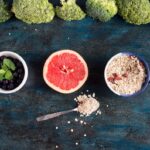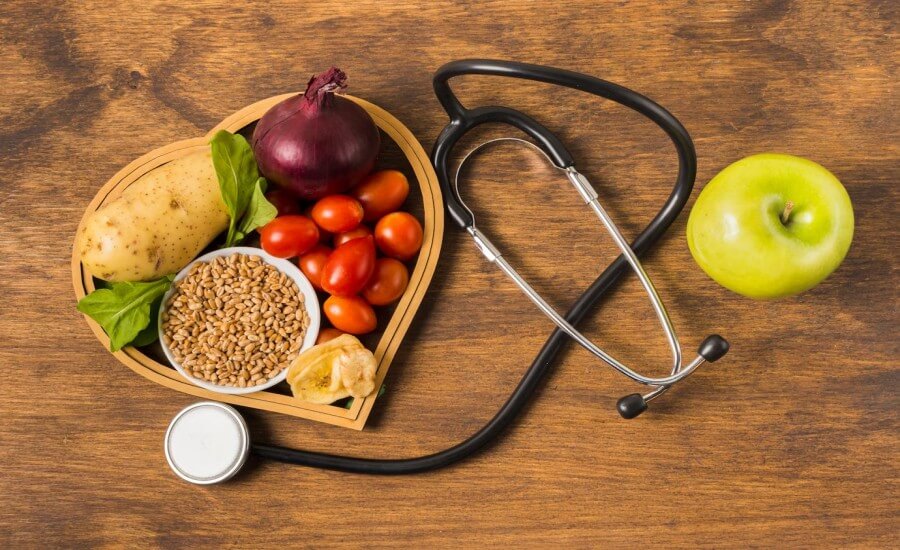Cardiovascular health is a cornerstone of overall well-being, and managing cholesterol levels is a critical component. High levels of LDL (“bad”) cholesterol are a major risk factor for heart disease, the leading cause of mortality globally, including here in India. Fortunately, lifestyle changes, particularly diet, offer powerful tools for prevention and management. This analysis examines how a vegan diet for lower cholesterol can effectively reduce harmful fats, support heart health, and promote long-term cardiovascular wellness.
We will examine this connection through the lenses of nutritional science, ethical considerations, environmental impact, and practical daily living, providing a comprehensive understanding of this delicious and effective plant-powered approach.
Heart Health: How a Vegan Diet Lowers Cholesterol Naturally
LENS 1: Nutritional Analysis – How Plants Battle Bad Cholesterol
From a nutritional standpoint, a well-constructed vegan diet directly targets several key factors influencing blood cholesterol levels and cardiovascular risk.
- Elimination of Dietary Cholesterol: Avegan diet contains zero dietary cholesterol, removing this direct input. While the body produces its own cholesterol, reducing dietary intake is beneficial for many.
- Low Saturated and Trans Fats: Vegan diets are typically much lower in saturated fats (found predominantly in animal fats and some tropical oils) and free from industrial trans fats (often found in processed animal and baked goods). High intake of these fats raises LDL cholesterol.
- Abundant Soluble Fiber: Foods like oats (beta-glucans), barley, beans, lentils, apples, citrus fruits, and flaxseeds are rich in soluble fiber. This type of fiber forms a gel in the digestive tract, binding to bile acids (which are made from cholesterol) and preventing their reabsorption. The liver then pulls more cholesterol from the bloodstream to make new bile acids, effectively lowering blood cholesterol.
- Plant Sterols and Stanols: Found naturally in small amounts in plant cell membranes (nuts, seeds, legumes, vegetable oils) and added to fortified foods (some margarines, juices, yogurts). These compounds structurally resemble cholesterol and block its absorption from the gut.
- Healthy Unsaturated Fats: Replacing saturated fats with unsaturated fats (monounsaturated from avocados, nuts, olive oil; polyunsaturated omega-6s and omega-3s from nuts, seeds, vegetable oils) helps lower LDL and may support HDL (“good”) cholesterol levels.
- Antioxidant Protection: Plant foods are rich in antioxidants, which help prevent the oxidation of LDL cholesterol. Oxidized LDL is particularly damaging to artery walls and contributes to plaque formation (atherosclerosis).
- Important Considerations: While excellent for cholesterol, ensure adequate Vitamin B12 (via fortification/supplements) and consider an algal oil supplement for pre-formed Omega-3 DHA/EPA, as both are crucial for overall cardiovascular health beyond just cholesterol metrics. What cholesterol-lowering plant foods could you easily add to your daily routine?
Nutritional Deep Dive: Soluble Fiber’s Mechanism
Imagine soluble fiber like a sponge in your gut. When you eat foods rich in it (like oats or beans), it absorbs water and forms a thick gel. This gel traps bile acids, which your liver produced using cholesterol to help digest fats. Normally, most bile acids are reabsorbed further down the intestine and recycled.
But the fiber gel carries them out of the body. Your liver, sensing the depletion, takes LDL cholesterol from your blood to synthesize replacement bile acids. This process effectively lowers your circulating LDL cholesterol levels.
Voice of Experience (Cardiologist): “Decades of research support the benefits of plant-based diets for cardiovascular health. They directly address major risk factors by eliminating dietary cholesterol, drastically reducing saturated fat, and increasing intake of beneficial fiber and phytonutrients.
For many patients, adopting a whole-food vegan diet can be as effective, or even more effective, than medication for managing cholesterol, often with positive side effects instead of negative ones.” – Dr. Arjun Sharma, Preventive Cardiologist
LENS 2: Ethical Framework – Health as an Extension of Values
While the primary driver of ethical veganism is typically animal welfare or environmental concern, the positive impact on personal health, like lower cholesterol, adds another dimension.
- Harm Reduction – Animals and Self: Choosing veganism fundamentally aims to reduce harm to animals. Discovering that this same choice significantly benefits one’s own health creates a powerful synergy, reinforcing the decision and potentially leading to greater long-term adherence.
- Empowerment and Agency: Taking control of one’s health through conscious dietary choices, rooted in ethical convictions, can be incredibly empowering. It shifts the focus from passive acceptance of risk or sole reliance on interventions towards proactive self-care aligned with values.
- Critiquing Unhealthy Systems: An ethical lens can also critique food systems that promote cheap, processed, animal-heavy foods contributing to widespread chronic diseases like heart disease, while simultaneously causing immense animal suffering and environmental damage. Choosing a heart-healthy vegan diet becomes an act of resistance against these systems.
- Health Equity: While promoting dietary change, it’s ethically important to acknowledge systemic barriers (access, cost, education) and avoid blaming individuals. The focus should be on creating systems that support healthy, ethical choices for everyone, while respecting the need for medical interventions when necessary. How does knowing your food choices benefit both animals and your own heart health feel?
Hidden Benefits: Reduced Health Anxiety
Actively managing cholesterol through a diet aligned with one’s ethics can alleviate anxiety surrounding both health outcomes and the ethical compromises sometimes felt with conventional diets. This potential reduction in chronic stress can itself be beneficial for cardiovascular health.
Voice of Experience (Public Health Advocate): “Promoting plant-based diets addresses multiple ethical imperatives simultaneously. It reduces animal suffering, lessens environmental impact, and demonstrably improves public health outcomes, particularly concerning cardiovascular disease. It’s a powerful intervention that aligns personal well-being with broader ethical responsibilities.” – Priya Desai, Health Policy Advisor
Critical Reassessment: Avoiding Oversimplification
While diet is powerful, heart health is complex. Ethical veganism doesn’t negate the importance of genetics, regular medical check-ups, or the necessity of cholesterol-lowering medication for some individuals. The ethical stance supports informed choice and access to all effective interventions.
LENS 3: Environmental Scientist’s Analysis – Healthy Planet, Healthy Arteries
The dietary patterns recommended for lowering cholesterol align remarkably well with those offering significant environmental benefits.
- Lower Footprint of Heart-Healthy Staples: Key cholesterol-lowering foods—legumes, whole grains (like oats), fruits, vegetables, nuts, and seeds—generally require far less land, water, and energy to produce, and generate significantly fewer greenhouse gas emissions compared to animal products, particularly red meat and dairy, which are high in saturated fat.
- Reduced Exposure to Environmental Cardiotoxins?: While research is ongoing, some environmental pollutants associated with industrial agriculture (e.g., certain pesticides, air pollutants from factory farms) are being investigated for potential links to cardiovascular issues. Reducing reliance on these systems may lessen exposure.
- Water Quality and Conservation: Animal agriculture is a major consumer and polluter of water resources. Shifting to plant-based diets conserves water and helps protect aquatic ecosystems, contributing to overall environmental health which supports human health.
- Synergistic Benefits: Choosing a diet for heart health is often choosing a diet for planetary health. This synergy offers a compelling motivation for adopting and maintaining a plant-based lifestyle. Does knowing your heart-healthy choices also help the environment add to your motivation?
Market Transformation Map Suggestion: A visual showing the growth of plant-based milk alternatives (especially oat milk, known for beta-glucans), meat alternatives using heart-healthy proteins (like soy or pea), and snacks specifically marketed as “heart-healthy” and vegan.
Voice of Experience (Environmental Health Scientist): “The overlap is undeniable. Dietary recommendations for reducing cardiovascular risk – emphasizing plants, limiting red meat – mirror recommendations for reducing our environmental footprint. Shifting food systems towards plant-based models offers a powerful co-benefit for human and planetary health.” – Dr. Kenji Tanaka, Environmental Health Professor
LENS 4: Everyday Practitioner’s Experience – Deliciously Taking Control
For individuals using a vegan diet to manage cholesterol, the journey involves practical steps, delicious discoveries, and often, rewarding results.
- Seeing the Numbers Change: Many practitioners report significant drops in their LDL cholesterol levels after consistently following a whole-food vegan diet, often confirmed by blood tests, providing strong motivation.
- Practical Meal Planning: Success involves consciously incorporating cholesterol-lowering foods daily: starting the day with oatmeal, adding beans or lentils to lunches and dinners, snacking on nuts, using flaxseeds, and cooking with healthy oils.
- Discovering Flavor: Far from restrictive, heart-healthy vegan eating opens up a world of flavour through herbs, spices, diverse vegetables, legumes, and whole grains. Many discover new favourite dishes.
- Navigating Challenges: Reading labels on processed vegan foods (some can be high in sodium or unhealthy fats), handling social eating situations, and ensuring adequate B12/Omega-3 intake require attention. Consulting healthcare providers remains essential.
- Focusing on the Positive: Practitioners often emphasize feeling more energetic, achieving weight loss (if needed), and enjoying the peace of mind that comes with taking proactive steps for their heart health. What delicious vegan meal featuring cholesterol-lowering foods could you try this week?
Daily Impact: A Heart Healthy Vegan Day
- Breakfast: Oatmeal cooked with fortified plant milk, topped with berries, chia seeds, and a sprinkle of walnuts. (Soluble fiber, ALA omega-3, antioxidants).
- Lunch: Large mixed green salad with kidney beans, cucumber, tomatoes, bell peppers, topped with sunflower seeds and a lemon-tahini dressing. Whole-grain pita on the side. (Fiber, protein, healthy fats, zinc).
- Dinner: Lentil shepherd’s pie with a sweet potato topping, served with steamed green beans. (Soluble fiber, protein, beta-carotene, antioxidants).
- Snacks: An apple with almond butter, a small handful of almonds. (Soluble fiber, healthy fats, Vit E).
- Hydration: Water and herbal teas throughout the day.
Voice of Experience (Individual who lowered cholesterol): “My doctor wanted to put me on statins, but I asked to try diet first. I went fully vegan, focusing on oats, beans, nuts, and tons of veggies. Six months later, my LDL had dropped over 50 points! It took effort, but I feel so much better and empowered, and the food is honestly delicious.” – Rajesh Kumar, Engineer
Alternative Approaches: Variations on a Theme
While a whole-food vegan diet is highly effective, variations like the Portfolio Diet (specifically emphasizing a combination of cholesterol-lowering foods), or Mediterranean-style vegan eating (rich in fruits, vegetables, nuts, olive oil, legumes) offer structured, heart-healthy approaches within a plant-based framework.
PERSPECTIVE INTERSECTION MATRIX
- Nutrition & Practice: Scientific evidence (Lens 1) guides practitioners (Lens 4) on which foods to include for cholesterol management. Positive results (Lens 4) validate nutritional recommendations (Lens 1).
- Ethics & Health: Ethical choices (Lens 2) lead to dietary patterns proven healthy by science (Lens 1), reinforcing both motivations. Good health (Lens 1, 4) enables sustained ethical action (Lens 2).
- Environment & Nutrition: Foods beneficial for heart health (Lens 1) often have lower environmental impacts (Lens 3), creating a win-win scenario promoted by both fields.
- Practice & Marketing: Marketing of heart-healthy vegan products (related to Lens 3 market shifts, influenced by Lens 1 science) impacts practitioner choices (Lens 4). Practical experience (Lens 4) drives demand for convenient, healthy options.
- Ethics & Environment: The ethical imperative to reduce harm (Lens 2) aligns with environmentally conscious food choices (Lens 3), both of which often point towards plant-based diets beneficial for heart health (Lens 1).
MISCONCEPTION ANALYSIS
| Misconception | Reality |
| You need animal products for a healthy heart. | Plant-based diets are consistently linked to better heart health outcomes. Essential nutrients like iron and protein are readily available from plants; B12 requires supplementation/fortification. |
| All dietary fat is bad for cholesterol and heart health. | Unsaturated fats (mono & poly) are heart-healthy and can help lower LDL when replacing saturated fats. Saturated and trans fats are the primary dietary fats that raise LDL cholesterol. |
| Vegan diets are automatically heart-healthy. | Highly processed vegan foods can be high in unhealthy fats, sodium, and sugar, potentially harming heart health. A whole-food, balanced vegan diet provides the benefits. |
| Cholesterol levels are purely genetic and diet doesn’t matter much. | Genetics play a role, but diet has a powerful influence on blood cholesterol levels for most people. A heart-healthy vegan diet can significantly lower LDL even in those with genetic predispositions. |
| Avoiding dietary cholesterol is the most important factor. | While helpful, reducing saturated and trans fat intake, and increasing soluble fiber intake, often have a greater impact on lowering blood cholesterol levels than eliminating dietary cholesterol alone for many people. |
KEY TURNING POINTS
- Early Epidemiological Studies (e.g., Framingham, Seven Countries Study): Established strong links between dietary patterns (high saturated fat/cholesterol) and cardiovascular disease risk, laying the groundwork for dietary interventions.
- Discovery of LDL Receptor (Brown & Goldstein, Nobel Prize 1985): Elucidated the mechanism of cholesterol regulation in the body, paving the way for understanding how diet and drugs affect cholesterol levels.
- Research on Soluble Fiber (Beta-Glucans): Specific identification and research on the cholesterol-lowering effects of soluble fiber, particularly beta-glucans in oats and barley, led to health claims and specific dietary recommendations.
- Dean Ornish Lifestyle Program Studies (1990s): Demonstrated that a very low-fat vegetarian (near-vegan) diet, combined with lifestyle changes, could not only lower cholesterol but potentially reverse coronary artery disease.
- Rise of Plant-Based Nutrition in Mainstream Health: Major health organizations increasingly recommending plant-forward or plant-based diets for heart disease prevention and management, reflecting accumulating evidence.
SYNTHESIS & RECOMMENDATIONS
The evidence is compelling: a well-planned vegan diet is a highly effective strategy for lowering LDL cholesterol and improving overall cardiovascular health. By eliminating dietary cholesterol, drastically reducing saturated fat, and significantly increasing intake of soluble fiber, plant sterols, and protective antioxidants, this eating pattern directly targets the key mechanisms of cholesterol regulation.
It offers a delicious, empowering approach that aligns personal health goals with ethical considerations and environmental responsibility. While consistency and attention to specific nutrients like B12 and Omega-3s are important, the potential benefits for your heart – and happiness – are substantial.
Recommendations:
- Embrace Soluble Fiber: Make oats, barley, beans, lentils, flaxseeds, apples, and citrus fruits staples in your diet.
- Swap Your Fats: Replace saturated fats (from animal products, coconut/palm oil) with unsaturated fats (avocado, nuts, seeds, olive oil).
- Prioritize Whole Foods: Build meals around unprocessed fruits, vegetables, legumes, and whole grains. Limit processed vegan items high in sodium, sugar, or unhealthy fats.
- Include Nuts and Seeds: Snack on them or add them to meals for healthy fats, fiber, and plant sterols.
- Consider Soy Foods: Tofu, tempeh, and edamame are heart-healthy protein sources.
- Supplement Wisely: Ensure reliable B12 intake and consider an algal oil DHA/EPA supplement for comprehensive heart protection.
- Partner with Your Doctor: Discuss dietary changes with your healthcare provider and monitor cholesterol levels regularly.
FURTHER AREAS OF EXPLORATION
- Vegan Diets and Blood Pressure Management
- The Role of the Gut Microbiome in Cardiovascular Health and Vegan Diets
- Plant-Based Diets for Reversing Heart Disease
- Specific Phytonutrients (Flavonoids, Nitrates) and Vascular Health
- Vegan Diets and Triglyceride Management
- Comparing Different Plant-Based Dietary Patterns for Heart Health (e.g., Vegan vs. Vegetarian vs. Pescatarian)












